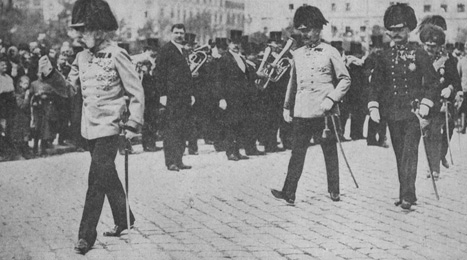The Radetzky March
The Radetzky March, by Joseph Roth (1932), translated by Michael Hofmann (2002)
Joseph Roth's novel takes its name from one of the jolliest marching tunes penned under the Habsburgs. Johann Strauss Senior rustled up this rollicking tune, and a hundred years ago you could hear it in market towns the length and breadth of the Empire.
Roth's tale may not be a swashbuckling romp to stamp your feet to, but like Strauss's hit, it glides across the Habsburg dominions, from Slovenia to Vienna and on into the farthermost fringes of Galicia. As such, the novel would make for a fine companion to any journey through Central Europe, be you in Vienna, Krakow, Lviv or Ljubljana. Indeed, of all the novels that deal with the twilight of Habsburg rule, this one can lay a fair claim to being the best.

Above: Emperor Franz Joseph, followed by the ill-starred Archduke Franz Ferdinand. Are the chaps with top hats and trombones playing 'The Radetzky March'?!
The Radetzky March follows the destiny of a family of humble Slovenian origins who rise to prominence through valour on the battlefield. Ennobled by the Emperor, the Trottas become part of the establishment, but by this stage, the cosmopolitan empire is beginning to come apart at the seams.
Author Joseph Roth (1894-1939) is uncanny at evoking a sense of place, and Michael Hofman's translation has unveiled the novel to wonderfully lyrical effect. The whole work has a dream-like quality, and there is a brooding sense of foreboding throughout. Each chapter begins in grand style, like a galleon heading off on some worthy quest.
Much of the The Radetzky March is focused on Carl von Trotta, who on joining the army, struggles to live up to the legend of his grandfather. The novel is peopled with memorable characters, such as the nonchalant Polish Count Chojnacki and the troubled Doctor Demant. Even some of the peripheral figures are beautifully sketched, such as Lieutenant Taittinger, 'whose single passion in life was the consumption of pastries.'
Roth makes no secret of his nostalgia for the liberal climate of the latter years of the Empire. Austria was a mess after the First World War, and Roth's Jewish descent placed him in an impossible position when fascist waves crashed over Europe. However, The Radetzky March is far more than an exercise in mawkish sentimentality, and the Habsburg regime is not given a white-washing.
Roth was largely a forgotten figure for several decades, and this, his most acclaimed novel, was rarely cited by Western academics. However, when Michael Hofmann published the current translation, writers queued up to hail The Radetzky March as one of the great European novels of the twentieth century - some consolation for the embattled author, who died tragically at the advent of war in 1939.
The Radetzky March: Some Naked Truth
By including the following anecdote we risk exploding the solemnity of the novel's theme. But all things considered, Roth had a pretty good sense of humour and we're sure he'd enjoy the ditty that's about to be dished up. So on with the sleaze!
As mentioned, The Radetzky March takes its name from the mega-hit tune of Strauss Senior. It was a tribute to the Austrian General, Joseph Radetzky, hero of the Battle of Novara (1849). That said, it seems that not all the inhabitants of the Empire were as reverential of the great Radetzky as the army would have liked. Over in Lemberg ( Lwow, Lviv), the largely Polish and Ukrainian populace came up with their own tribute to the great Radetzky. Their ditty was a popular feature of the local taverns, and Roth may well have heard it there as a student in the years before the Great War. So without further ado, The Radetzky March a la Lemberger:
Radetzky's lying in his bed
With beloved wife Elizabeth,
They lie so calmly
Nose to nose
And play with little rubber hose!
Radetzky's lying in his bed
With beloved wife Elizabeth,
They lie so calmly
Ass to ass
And whistle the Radetzky March!
(Radetzky liegt in seinem bett
Mit seiner Frau Elizabeth
Sie liegen ruhig
Bauch am bauch
Und spielen mit den Gummischlauch!
Radetzky liegt in seinem bett
Mit seiner Frau Elizabeth
Sie liegen ruhig
Arsch am Arsch
Und pfeffen den Radetzky Marsch!)
Vienna Life owes this priceless ditty to the delightful book Austriackie Gadanie (Austrian Palaver), by Leszek Mazan and Mieczyslaw Czuma (Krakow, 1998). Translation of poem into English by Marta A. Urbanska and Nick Hodge.